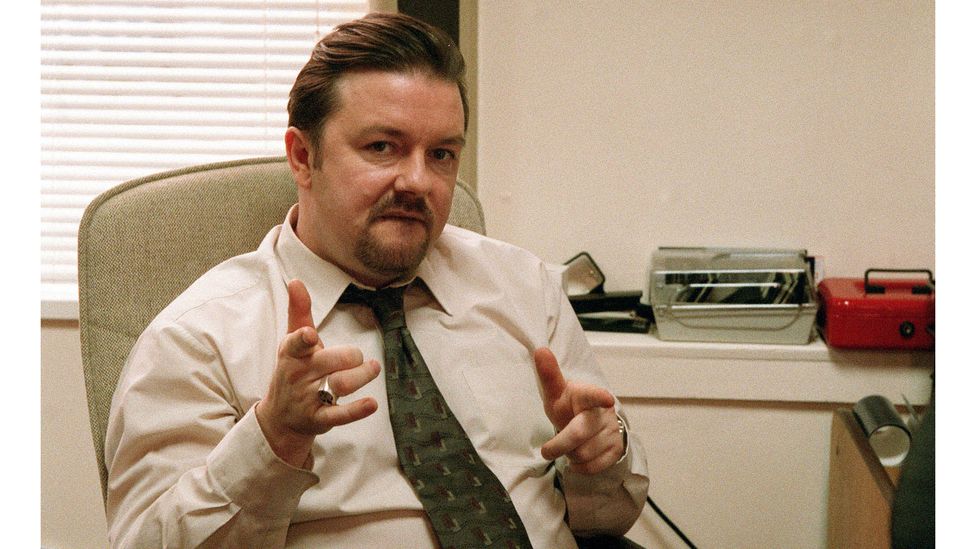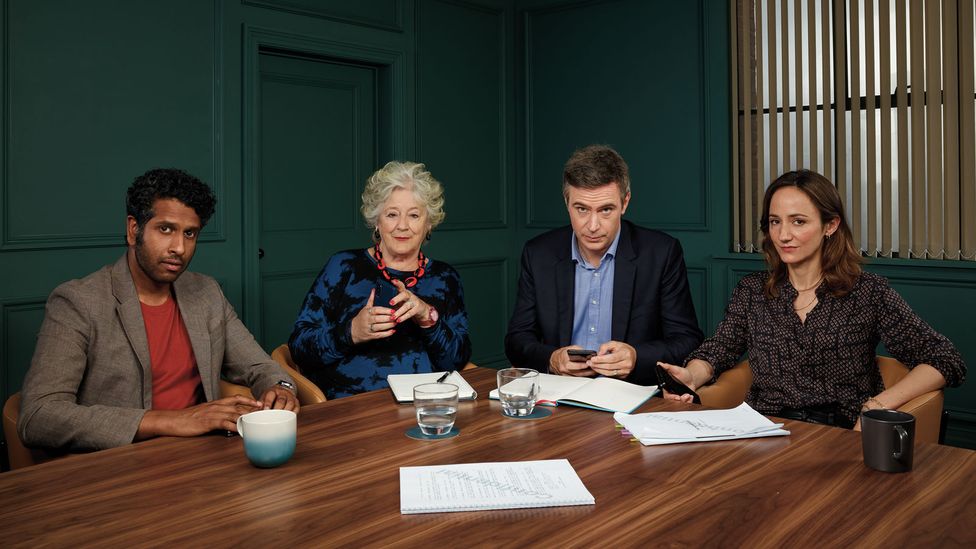The French show that stormed the world

The stakes are always high in television. It is expensive to make, and, as the recent news about Netflix has shown, people can cancel subscriptions in a heartbeat. But when it comes to remaking a beloved programme in another country, they are raised that little bit higher. For better or worse, when a show does phenomenally well in its own territory, TV executives start getting itchy fingers and surveying a map of the world. The rights to the show could be sold to networks abroad – like Frasier being endlessly repeated on the UK’s Channel 4, to choose an old-school example – but what if they could do one step better? What if another country were so enamoured with a show that they wanted to buy the concept and remake it themselves?
More like this:
– The TV shows that reveal the real France
– Why film and TV get Paris so wrong
– 13 TV shows to watch in April
One of the most popular French shows in recent years has been France Télévisions’ Dix Pour Cent, a comedy about the frenetic world of Parisian showbusiness agents. Exploring a world brimming with gossip, power plays and romance, the show became a hit in France. Its episodes, which could veer between farcical miscommunication and affecting drama, also featured episode-long cameos from famous actors as the agency’s various clients. Jean Reno, Jean Dujardin and even Sigourney Weaver are some of the many stars who signed up to play themselves.
Seeing how popular it was, Netflix bought it in 2015, renamed it Call My Agent!, and raised the profiles of its core cast – Camille Cottin, Grégory Montel, Thibault de Montalembert and Fanny Sidney in particular – which, in turn, raised the show’s profile abroad. Audiences in the UK and US fell for its stylish, perhaps stereotypically French rhythms, as did other countries: around half a dozen remakes are in the offing. These include a British remake, confusingly called Ten Per Cent rather than Call My Agent!, which premieres on Amazon this week. Set in London, it will not just be judged on its own merits, but will be compared with the show from which it is translated. Will the comedy translate? Will it be too French? Too English? Not English enough? Not French enough?

Dix Pour Cent (Call My Agent!) is one of France’s most popular TV shows in recent years (Credit: Netflix)
There is a good reason that TV comedy remakes have so often been attempted, for all the their proven pitfalls. “Comedy was always very parochial; very tribal,” says Joel Morris, a British comedy writer who has written on both Paddington films as well as for people like Black Mirror’s Charlie Brooker and comedy duo David Mitchell and Robert Webb. He explains that the US tried to remake Fawlty Towers, John Cleese and Connie Booth’s seminal 1970s BBC sitcom about an angry hotelier, because Americans weren’t likely to watch a show from the UK. A strange and calculated risk has traditionally been undertaken with translating shows: that viewers in another country are more likely to watch a brand-new remake rather than the critically lauded masterpiece on which it’s based.
For a show like The Office, arguably the most successful British comedy of the last 30 years, this risk was taken in 11 countries. With some exceptions – Germany, five seasons; the US, nine – these foreign remakes only lasted one season. The magic of the original – Ricky Gervais’s quintessential office comedy set in the dreary nowhere of Slough – seems to have been difficult to recapture. “There’s a real obsession with formatting because it would really suit television if the format was the answer,” says Morris. Simply hoping that the show should translate abroad because the setting and characters were strong seems to have been foolhardy.

Arguably Britain’s most popular comedy series of the last 30 years, The Office was remade in 11 countries – with varying degrees of success (Credit: BBC)
But the US remake worked. Why? The idea that the shared language with the original was the key to its success is tempting but probably wrong; plenty of US remakes of British shows have sunk without a trace. The three attempts to remake Fawlty Towers, for example, were unsuccessful. Morris wonders if it was not just because it was good but because it wasn’t too close an adaptation of its inspiration; perhaps the key is to “not adapt it enough”. The central character of David Brent, for example, was made less grotesque when he became the American Michael Scott (Steve Carell).
A hard act to follow?
The logic behind translating shows is becoming increasingly sophisticated. With more data at their fingertips than ever before, platforms like Netflix can tell exactly where their programmes are being watched. If TV executives have access to the headlines – in other words, if they know that Squid Game is disproportionately popular in Turkey – they can follow the data and remake shows for specific territories. As such, perhaps the risk of adapting shows is less of a risk than ever. But, with the originals now so easily available on streaming platforms with dubbing or subtitles, why bother remaking the shows in the first place?
Ten Percent, written by John Morton, the man behind other British workplace sitcoms like W1A and Twenty Twelve, begs exactly this question. Based on the first two episodes, it is a curious animal. On the one hand, it is extraordinarily loyal to its parent show, featuring many of the same beats: the assistant getting fired; the female star being pressured to have cosmetic surgery; the patriarch head of the agency dying while away. But on the other, it invents a character that doesn’t exist in the original – Tim McInnerny being wonderful as a washed-up thespian – and makes baffling choices by watering down the comedy in the French version. In Dix Pour Cent, the head agent dies after swallowing a wasp; in Ten Percent he dies of… a heart attack. In Dix Pour Cent, after an agent shows his client a photo of his “wife” to reassure her that cosmetic surgery can be subtle, he disposes of the photo when she leaves – because in fact it was a photo of a much younger woman who he is not married to; in Ten Percent, the agent also shows his client a photo of his wife – but there’s no such punchline.
While copying the exact jokes from Dix Pour Cent might not be the most imaginative option, cutting jokes out of a comedy seems pretty fatal. Perhaps because of the baggage it carries from following Dix Pour Cent, Ten Percent may be too heavy to take flight. Can we explain the problem by simply saying that French humour is different to British, as some would have it? William Gregory, who has translated Spanish plays for British theatres like the Royal Court and the Old Vic, doesn’t think so. Gregory is “suspicious” of the idea that humour doesn’t cross cultures: while adapting a text will always involve translating from a foreign language certain words or phrases that don’t have a literal English translation, the difficulty may have been overstated, he thinks. After all, surely a shared sense of humour is exactly why British people like watching Dix Pour Cent? “Maybe human beings have more in common than we think in terms of comedy,” he tells BBC Culture.

Ten Percent is extraordinarily loyal to the original show – while cutting some of its jokes and watering down the comedy (Credit: Prime Video/ Rob Youngson)
But this doesn’t make translating shows straightforward. One of the complicating factors can be muddying the dynamics that existed between its original characters, or simply hoping that audiences won’t notice that the cultural background was unique to the original show. As Mark Lawson pointed out in The Guardian, “It’s no surprise that the attempted American remake of Dad’s Army bombed, because the US situation in World War Two was fundamentally different.” Some are wondering if Ten Percent can survive in the UK because the UK prefers losers to winners, and Dix Pour Cent is full of dynamic, crafty characters who often get their way.
Class is one of the quintessentially British obsessions that may have made it difficult to translate comedies from the UK to foreign markets. (Although Monty Python was riotously popular in the US, “One thing that is utterly lost on American audiences is how the Pythons use class-consciousness as a continual source of contextual humour,” wrote Gary L Hardcastle and George A Reisch in Monty Python and Philosophy: Nudge Nudge, Think Think!) But on the other hand, Morris says that in comedy it is status that really matters, rather than a uniquely British position on class.
Gregory, who also teaches translation, will get his students to imagine themselves in a rehearsal room with a director, asking them why they’ve translated a passage a certain way. If care is taken over each decision in this way, an adaptation ought to be able to stand on its own two feet. He is quick to name plays that prove the point that translations often work brilliantly. Art, for example, was translated by Christopher Hampton from a French script by Yasmina Reza and won a Tony award for best play in 2009. Some TV shows that have survived the journey abroad are the US Homeland, based on the Israeli show, Hatufim; All in the Family, the US adaptation of the British Till Death Us Do Part; and Yo soy Betty la fea, the Colombian show that was remade in the US as Ugly Betty. Morris mentions that the UK comedy writer Rufus Jones is having his sitcom Home adapted in the US. The series is about an immigrant who lives with an English family after hiding in the boot of their car, and Jones has been trying to convince executives that the show can’t be set in a “flyover” state – because immigrants famously arrive via the coast.
Arguing that there is never any such thing as a “literal translation”, Gregory points to the US version of Ugly Betty as an example of the amount of artistic licence that an adaptation can exercise. “In a sense, when you’re making something that is in effect brand-new then you’ve got all the licence in the world.” This might beg the question: why not make something that is in fact entirely brand-new? But, says Morris, “IP is everything.” A film about a spy gets little traction; a film about James Bond makes billions. A British sitcom about agents might struggle for coverage; a British version of Call My Agent! inspires press coverage.
Every translation is its own production, subject to all of the same problems as any original series. Whether or not it takes on a life of its own may not necessarily tell us whether people in other countries laugh at different things. In fact, it would appear that much of what we find funny is essentially universal. What the failure or success of a show does tell us is that programmes can rarely be remade in other countries without great care. In order to take off, these adaptations need to fly the nest, leave the comfort of their mother, and spread their wings for themselves.
Ten Percent is on Amazon Prime from Thursday 28 April.
Love film and TV? Join BBC Culture Film and TV Club on Facebook, a community for cinephiles all over the world.
If you would like to comment on this story or anything else you have seen on BBC Culture, head over to our Facebook page or message us on Twitter.
And if you liked this story, sign up for the weekly bbc.com features newsletter, called The Essential List. A handpicked selection of stories from BBC Future, Culture, Worklife and Travel, delivered to your inbox every Friday.








